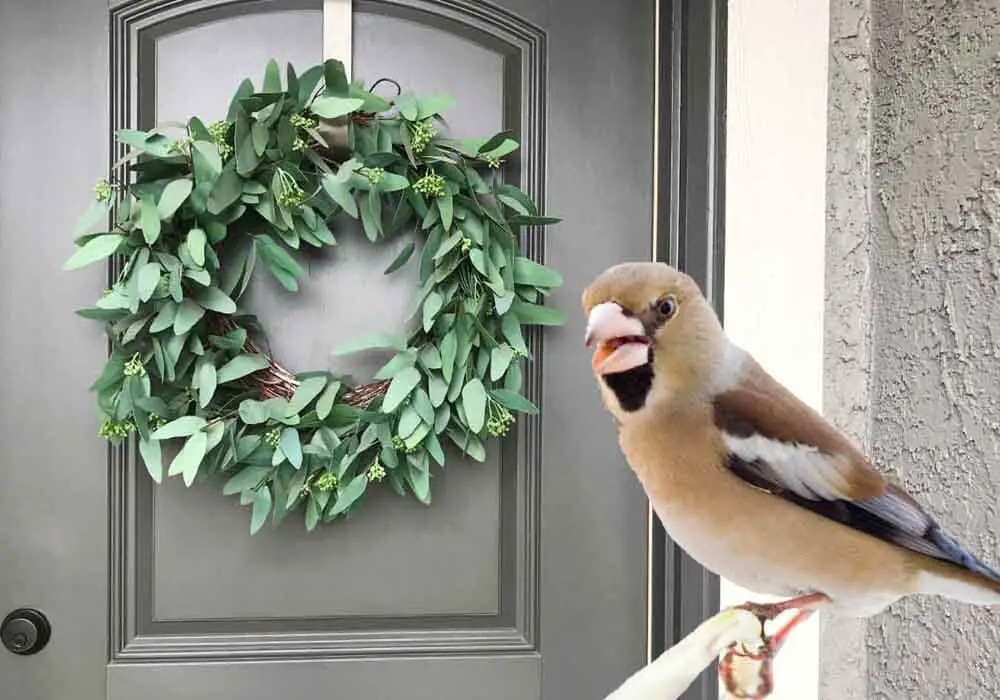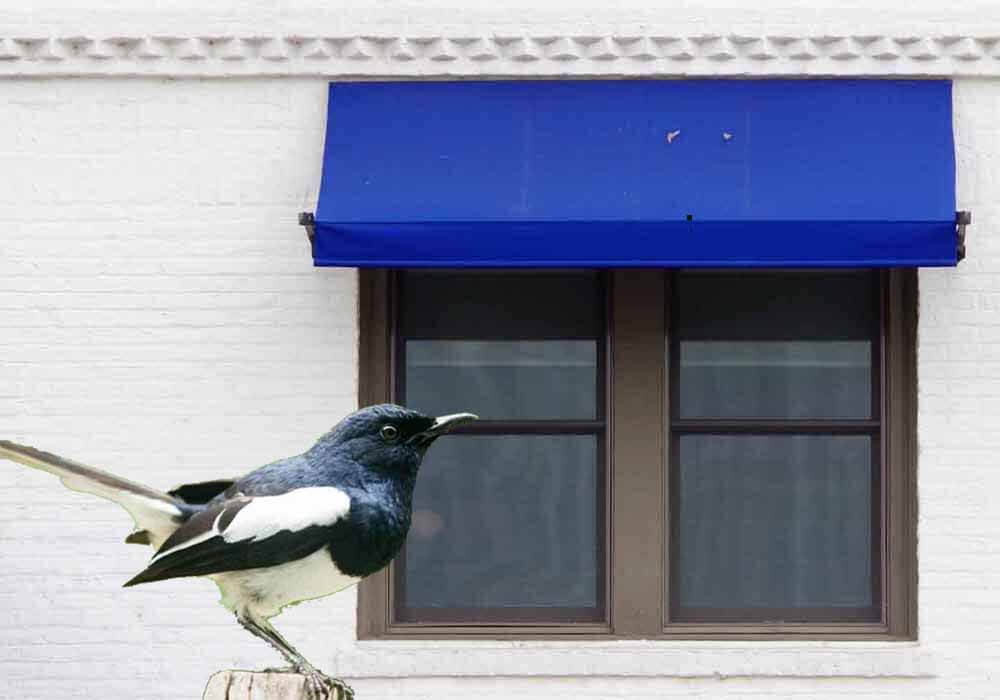How To Keep Birds From Building Nests in Wreaths
Wreaths are no longer just a winter holiday decoration. Many homeowners use seasonal ones all year long. The only problem with this practice is when little birds decide to make them their nest. So, if you're wondering how to keep birds from building nests in wreaths read on!
To keep birds from building a nest in your wreath, add shiny pieces of metal in or around the wreath, a strong scent birds dislike, or windchimes nearby. You could also use predator statues, or bird netting around the wreath.
This article will discuss various methods of keeping birds away from your wreaths. It will also explain what to do when you find a nest, including laws and how to remove a nest. Read on for everything you need to know about preventing birds from nesting in wreaths.

What Birds Build Nests in Wreaths?
Birds that build nests in wreaths include small, nest-dwelling birds, including the following:
- Robins
- Finches
- Juncos
- Carolina wrens
House swallows will occasionally nest in wreaths.
If you plan on putting a wreath on your front door during the holidays, you should plan on having it down before the nesting season starts in your area (unless you don’t mind having a feathered houseguest, that is).
Various types of birds are attracted to wreaths to build their nests, and the proximity to humans does not seem to bother them.
However, It is possible to keep a wreath up all year without having avian visitors. To do so, you must ensure you take the proper steps to deter these unwanted but harmless feathered visitors.
What Can You Put On Wreaths To Keep Birds Away?
You can put shiny objects on wreaths to keep birds away. Other solutions include adding a strong scent to the wreath, placing windchimes close by, or netting over the wreath. You could also use a fake predator statue on your porch.
Let’s explore these solutions in more detail below:
Add Shiny Objects in or Around Your Wreath
If you have some shiny and decorative metal that you can add to the wreath, it will deter birds from building a nest in the twigs. Most birds associate predators with shiny metallic objects.
Adding shiny metallic objects to a wreath can actually provide extra decorative value to your wreath. Examples include:
- Metallic baubles
- Silver tinsel
- Metallic beads
- Tiny pieces of mirrors
- Bird repellent reflectors
Add a Strong Scent to Your Wreath
Another method of keeping birds away from your wreath is adding a strong odor to it. However, you must consider that smells are short-lived, and you will need to spray your wreath regularly to ensure it continuously remains unappealing.
Scents you may want to consider adding to your wreath include the following:
- Garlic
- Peppermint
- Cayenne pepper
- Chili
- Vinegar
- Lemon
- Citronella
- Bird gel
Most of those are familiar scents but you may be curious about bird gel. Bird gel has a distinctive peppermint scent and has an ultraviolet light that is invisible to the human eye but intolerable to birds. It is also entirely safe and non-toxic for the birds and will keep them out of your wreaths.
Some essential oils and substances are harmful to birds, and examples of ones to avoid are the following:
- Eucalyptus
- Cinnamon
- Myrrh
Place Wind Chimes Nearby
Along with reflective devices, birds associate loud noises with predator activity. This makes wind chimes a great option.
Adding them close to your wreath or incorporating them into its design can keep the birds away. Additionally, if it is made of metal, the light reflections will aid in repelling the birds.Place Bird Netting on Your Wreath
Bird netting is another option. It will fully encase your wreath, making it inaccessible to the birds that want to make it their nesting site.
Unfortunately, bird netting can alter the look of your wreath (and sometimes not in a good way), making it unsuitable for some wreath styles.
PetiDream Bird Netting from Amazon is an excellent example of netting for wreaths. You can cut it to size and it’s durable enough to withstand sharp beaks that may try and remove it.
Use a Fake Predator Statue
While you won’t be able to put this option directly on your wreath, you can use a fake predator statue near it. Options like an owl will deter smaller birds from trying to make a nest in your wreath.
However, you will have to put in more effort with this method as the statue will need to be moved around to ensure the birds think it is real.
How Do You Get Rid of Bird Nests on a Wreath?
You can get rid of bird nests on a wreath by checking if there are eggs or chicks. If there are no eggs or chicks, you should gently remove the nest, and dispose of it. The birds will make a nest elsewhere.
Here’s what you need to know about removing bird nests from a wreath:
How To Remove an Abandoned Nest
The ideal time to remove a bird nest from your wreath is once it is entirely abandoned. You must take proper steps to ensure you stay safe while fully decontaminating your wreath. This includes wearing disposable gloves when you remove the nest, disposing of it safely, and decontaminating the wreath and your front door. You can do this with a water and bleach disinfectant solution.
If using a disinfectant on your wreath would cause the painted parts to run, you may need to throw it away.
Don’t Remove Nests With Eggs or Chicks
Moving a nest with babies or eggs puts the young birds’ lives at great risk because the mother will likely not have the time or strength to build a new one. If the nest in your wreath has a brooding mother, you will need to leave it as it is, and take preventative measures the next time.
It’s also worth noting that there are federal wildlife laws protecting active nests from being destroyed (an active nest is one with eggs or chicks). Although this law doesn’t protect invasive bird species, like House Sparrows or European Starlings, it would be cruel to destroy one of their active nests.
When You Should Not Remove a Nest
Unless there is a critical need to remove the below nests from your wreath, you should avoid disturbing them. For these situations, it is best to consult with wildlife professionals to ensure the best outcome for the birds and yourself.
- Endangered bird nests
- Nests of aggressive birds that will attack if you attempt to remove them
- Nests built in early summer that are likely to be reused
- Nests that already have eggs in them
Anytime there is likely to be harm caused to you or the bird, it is best to leave the nest where it is.
How To Keep Birds From Building Nests In Wreaths...Final Thoughts
Birds are crafty little creatures, building nests in just about anything. When you put a wreath on your front door, you were not expecting to create a bird hotel. With preventative measures, you can stop birds from nesting in your wreath. If you do not follow these steps, you may have to wait until the breeding season is over to remove a nest from your wreath.
Back To The TOP Of How
To Keep Birds From Building Nests In Wreaths Page

About the Author...
Richard Worden, a dedicated bird lover for over 20 years, I love to share my in-depth knowledge and passion for birds. Read more About Me and my expertise in this field.
- We Know Birds HOME ›
- How To Scare Away Birds From Your House Or Garden ›
- How To Keep Birds From Building Nests In Wreaths



